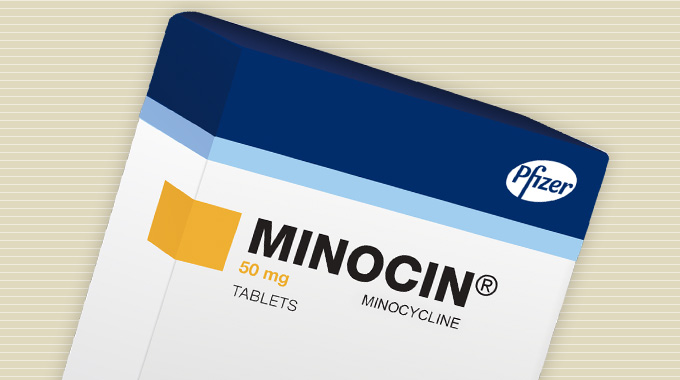Minocin (minocycline)
This medicine is a tetracycline antibiotic. It works by slowing the growth of the bacteria and letting the body`s immune system do the rest.

Dosage
The dosage of Minocin (minocycline) can vary depending on the specific condition being treated, the severity of the infection, and the individual patient's medical history. It is important to follow the instructions provided by your healthcare provider or the directions on the prescription label.
For most infections, the typical adult dosage of Minocin is 200 mg initially, followed by 100 mg every 12 hours. However, the dosage may be adjusted based on the type and severity of the infection.
For certain conditions such as acne, lower doses of Minocin may be prescribed, typically ranging from 50 mg to 100 mg once or twice daily.
For children, the dosage is usually determined based on their weight. The pediatric dosage of Minocin is typically prescribed as a once-daily dose, with the specific amount determined by the child's weight.
Composition
The medicine Minocin, is a semisynthetic derivative of tetracycline.It contains minocycline HCl equivalent to fifty miligramg of minocycline per 5 ml. The inactive ingredients of this medicine are Sodium Sulfite, Butylparaben, Calcium Hydroxide, Decaglyceryl Tetraoleate, Cellulose, Edetate Calcium Disodium, alcohol, Propylparaben, Propylene Glycol, Sodium Saccharin, and Sorbitol.
Uses
This medicine is used for the treatment of the following infections caused by the bacteria and microorganisms.It is used for the below infections:
- Q fever
- Cholera
- Campylobacter fetus infections
- Rickettsial pox
- Tick fevers
- Respiratory tract infections
- Inclusion conjunctivitis
- Endocervical
- Lymphogranuloma venereum
- Rectal infections
- Nongonococcal urethritis
- Rocky Mountain spotted fever
- Typhus fever
- Relapsing fever
- Chancroid
- Granuloma inguinale
- Plague
- Tularemia
- Brucellosis
- Psittacosis
- Bartonellosis
- Trachoma
Side Effects
Like all medicines Minocin can also cause side effects. Many people can report no, or minor, side effects post using this medicine. Some of the common side effects are listed below. Reach out to your doctor if you have these side effects or if they become bothersome or persistent. The side effects are dizziness, giddiness,diarrhea,loss of hunger,sore mouth,indigestion and vomiting. Apart from the ones listed above, there are some other side effects which can be serious in nature and will require immediate medical help.Severe allergic reactions such as itching, hives,rash, unable to breathe, tightness in the chest, swelling of the lips, mouth or face, decreased urine quantity, hearing problems, fever, chills, joint pain, muscle pain, persistent cough, sore throat, weakness, pain, redness, swelling, rectal or genital irritation, white patches in the mouth, swelling of the gums, seizures, shortness of breath, swollen glands, yellowing of the skin, pale stools, dark urine, persistent nausea, stomach pain, loss of appetite, severe stomach, back pain, trouble swallowing, unusual bruising or bleeding, unusual tiredness, vaginal discharge.
Contraindications
If you have any medical conditions or allergies, let your doctor know beforehand. This will help your doctor decide if he or she should prescribe this medicine for you. This medicine can make the birth control pills less effective and hence, the doctor may advise you a different form of birth control or a combination of two or more medicines. It can also reduce alertness in people post usage, hence it is advised not to drive or use heavy machinery. Some women can also experience a yeast infection due to the usage of this medicine. You should not drink alcohol while using this medicine as it may cause allergic reaction.

Pregnancy
It should not to be used during pregnancy as it can have adverse effects on the child. The medicine has been found in breast milk and can affect the baby.
Some frequently asked questions about Minocycline
What is minocycline?
Minocycline is an antibiotic medication that belongs to the tetracycline class. It is commonly used to treat various bacterial infections.
What conditions can minocycline treat?
Minocycline is often prescribed to treat respiratory tract infections, urinary tract infections, acne, sexually transmitted infections (such as chlamydia), and certain skin and soft tissue infections.
How is minocycline taken?
Minocycline is usually taken orally in the form of capsules or tablets. The dosage and duration of treatment will depend on the specific infection and the severity of the condition. It is important to follow the prescribed instructions and complete the full course of treatment.
Are there any side effects associated with minocycline?
Like any medication, minocycline can cause side effects. Common side effects may include nausea, diarrhea, dizziness, and skin rash. In rare cases, minocycline may cause more serious side effects, such as severe allergic reactions or liver problems. If you experience any severe or persistent side effects, seek medical attention.
Can minocycline interact with other medications?
Minocycline may interact with certain medications, including oral contraceptives, antacids containing aluminum or magnesium, and blood thinners. It is important to inform your healthcare provider about all the medications you are currently taking to avoid potential interactions.
Can minocycline be used during pregnancy or while breastfeeding?
It is important to consult with your healthcare provider before using minocycline during pregnancy or while breastfeeding. They can evaluate the potential risks and benefits and provide guidance based on your specific situation.
What should I do if I miss a dose of minocycline?
If you miss a dose, take it as soon as you remember. However, if it is close to the time for your next scheduled dose, skip the missed dose and continue with your regular dosing schedule. Do not double the dose to make up for the missed one.
How should minocycline be stored?
Minocycline should be stored at room temperature, away from moisture and heat. Follow the storage instructions provided with the specific product or consult your pharmacist for guidance.
- Download in PDF » Minocin: Product Information


